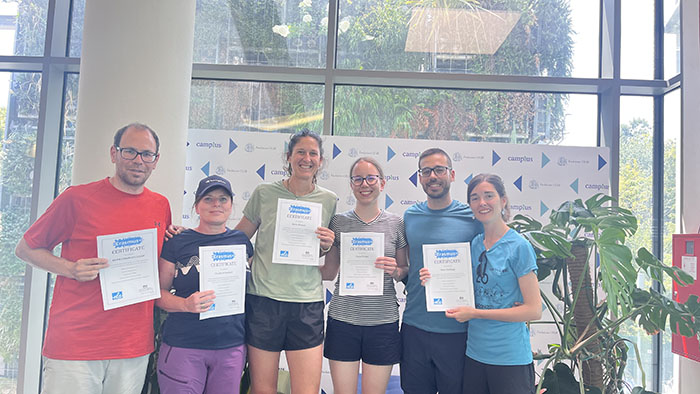Bologna, the cradle of knowledge
Bologna is mainly known for its university, as it is the oldest in the Western world (founded in 1088) and one of the oldest and most prestigious in Europe. This city was famous in medieval times for its teaching of humanities and law, becoming a benchmark in the dissemination of knowledge. So much so that its model became a beacon of knowledge and innovation, inspiring universities such as Oxford, Paris, and Salamanca.
This summer, I had the opportunity to take part in the Outdoor Learning training course organized by Erasmus Learning Academy, which took place in this exciting red-brick city. The course was held at the Bononia Camplus student residence, and despite it being July, there was a palpable student atmosphere both in the city and in the residence. This did not surprise me too much, knowing that with its various faculties, it welcomes thousands of Italian and foreign students every year.
I was lucky enough to share the classes with five other education professionals: Maria, a physical education teacher in vocational and secondary education (Barcelona); Panna, a psychologist and counselor (Budapest); Javi, a university physical education teacher (Valladolid); Claudia, a German teacher (Frankfurt); and finally, Francesco, our Italian teacher (Bologna). -Sorry for not introducing myself earlier, my name is Mara, I am a secondary school teacher from Munda.
Benefits of outdoor learning
To my surprise, each of the course participants taught very different subjects, and we were all looking to acquire different tools to put into practice in our schools. One thing that all the members of the group agreed on was that outdoor learning is an educational approach that seeks to place the student at the center of the educational process and can be used to acquire various skills, both specific and cross-curricular.
In short, outdoor learning is about students learning in natural environments. And it has been proven that this type of education encourages creativity and critical thinking, strengthens physical health and emotional well-being, promotes cooperation and communication, increases motivation, and helps students reflect on sustainability.
By leaving the classroom, beyond the repetition of content, learning through experimentation and discovery is encouraged. It can be put into practice while taking a walk around the city, in a natural environment, or even by teaching a class in the schoolyard. In the case of Mundaiz School, being surrounded by the Urumea River and Cristinaenea Park favors the application of this methodology.
From theory to practice
The activities carried out during the Bologna course can be classified into two groups. On the one hand, there were activities designed to develop cross-curricular skills (team building, communication, role-playing, group work, improvisation, etc.); and on the other hand, there were activities related to the curriculum content (natural sciences, mathematics, languages, art, etc.). Therefore, applying these activities can be useful both for tutoring and for certain subjects.
Among the various activities carried out, there were some that deserve special mention: measuring buildings or natural elements, collecting natural resources either for creating geometric drawings, works of art, or solving equations, and a 5-minute walk in absolute silence as inspiration for creating a poem. And, without a doubt, my favorite: a competition with the goal of collecting trash.
It is worth mentioning that the biggest challenge in implementing certain team-building dynamics is the large number of students we have in each class at our school (usually 30 students per class). Certain exercises require a smaller group of students. Therefore, it is considered appropriate when the teacher is with half the class (for example, during introspection classes).
The week in Bologna helped me realize that you often don’t have to go very far to do outdoor activities, and that the learning process is always more exciting when there’s a touch of adventure involved. Francesco, with his constant feedback, showed us the importance of creating a good atmosphere for meaningful teaching. Beyond laughter, good food, and cultural visits, it was very enriching to share conversations and experiences with teachers from other countries.
Now we need to plant the seed brought back from the cradle of knowledge.

